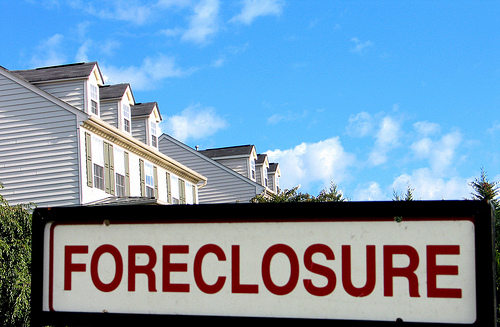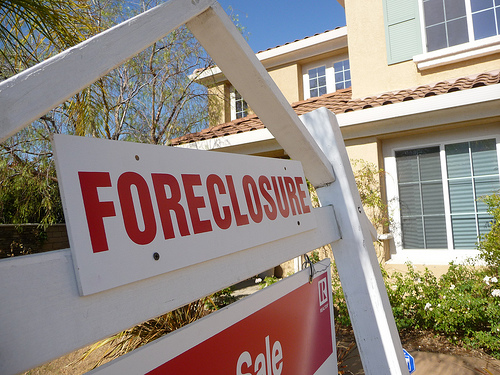
Flickr/taberandrew
Black homeowners hit hard by the housing crisis and economic downturn are disproportionately shut out of the Obama administration’s multibillion-dollar homeowner rescue effort, the Home Affordable Modification Program (HAMP). This startling new finding appears in a first-of-its-kind poll conducted by a leading housing advocacy group, the National Community Reinvestment Coalition, in conjunction with a hearing by the House oversight committee today investigating why HAMP has failed beleaguered homeowners and hardly slowed the rising tide of foreclosures. A copy of the report laying out NCRC’s findings was first obtained by Mother Jones before its public release.
According to NCRC’s findings, white homeowners eligible for the HAMP program are 50 percent more likely than blacks to receive a loan modification, which can lower monthly mortgage payments and help homeowners keep their homes. Loan servicers, the poll finds, foreclosed on black homeowners who were late on their mortgage payments noticeably faster than white or Hispanic borrowers. The poll’s finding here “suggests that lenders and servicers push delinquent Black or African-American borrowers into the foreclosure process much sooner than borrowers from other racial and ethnic groups.” Black homeowners who did receive modifications also saw smaller reductions in their loan’s interest rate—an average drop of 2.84 percentage points—than did whites and Hispanics—3.32 and 3.35, respectively. So telling is NCRC’s finding relating to racial differences that the group calls for “fair lending investigations of [the] HAMP program and participating servicers.”
NCRC’s poll is the first to investigate whether servicers and lenders treat people differently during the modification process due to race.
The poll is equally damning in its broader examination of HAMP, the Treasury Department’s flagship homeowner initiative. As others have pointed out, HAMP’s results have been dismal at best: Despite originally claiming that HAMP would help 3 to 4 million people—around 270,000 every three months—the program has only resulted in 170,000 permanent mortgage modifications in a year’s time. In NCRC’s poll, they found homeowners surveyed were more likely to get lasting help if they weren’t eligible for HAMP than if they were.
The NCRC’s new data comes amidst heightened scrutiny surrounding HAMP. Led by Rep. Darrell Issa (R-Calif.), the House oversight committee has been investigating why the program has helped so few people despite the billions at its disposal, while also highlighting the Treasury’s quiet changes to airbrush its floundering effort. “The only entity that won’t face the facts is the Department of the Treasury, which runs the program and has been desperate to hide the program’s poor performance,” Issa wrote in a March op-ed published with Rep. Jim Jordan (R-Ohio).
Nearly half of the respondents in NCRC’s poll were over the age of 50, and most were minorities. (Respondents’ hometowns spanned the country.) The poll looked at both HAMP modifications and private modifications, designed by, say, a mortgage servicer outside of the government’s program. A majority (40.5 percent) of those polled, however, didn’t receive any modification at all. The 30 percent who did said the help they received wasn’t all that great. Very few reported receiving a reduction on their principal (the core amount owed on a mortgage), even though these reductions offer homeowners the best chance of saving their houses; most saw their interest rates reduced. NCRC states that these payment reductions likely aren’t sufficient to make a substantive difference for homeowners.
Getting a modification, it turns out, is the biggest battle of all, the poll finds. Seven in ten homeowners polled said they had to resubmit their paperwork to their mortgage company to get help, and they had to do so an average of three different times. (Some homeowners reported having to mail their financial documents, applications, tax records, and so on up to 11 times.) It’s little wonder, then, that a majority of those polled described dealing with their servicer as a “bad” or “very bad” experience.
All told, the NCRC surveyed 179 distressed homeowners for the poll. While that figure isn’t nationally representative group, the report says, it does offer many new and important insights into HAMP—and little good news about Obama’s centerpiece program. As foreclosures pile ever higher—last year, in HAMP’s first year, they smashed the previous record—HAMP is failing to seriously tackle the housing crisis, instead hanging American homeowners out to dry.






